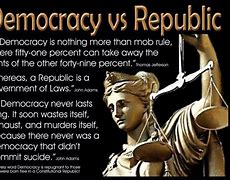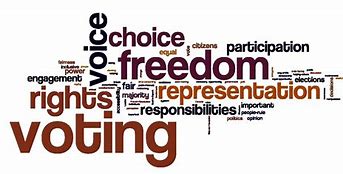We too often mistake “democracy” for “democratic”. We do not live in a “democracy”, rather we live in a “democratic constitutional republic”.
We are a Constitutional Republic, not a Democracy. The ideal of a democracy is universal equality. The ideal of a constitutional republic is individual liberty. Democracy always degenerates into dictatorship which always promises equality and security, but it delivers nothing but poverty and serfdom for the people it robs and rules. America was founded as a constitutional republic to safeguard the liberties of the people against the tyranny of democracy or of one man dictatorship. In this century great strides have been made towards the goal of subverting our republic into a democracy. The foremost tactic of the subverters is the subversion of language by calling America a democracy until people thoughtlessly accepted and used the term. The totalitarians have obscured the real meaning of the principals of our form of government.

Benjamin Franklin, in his admonition …”you have a republic if you can keep it…” looked through the mists of time to see a period when people would freely give up their liberties in a constitutional republic for the promise of government guaranteed security and equality in a democracy
In 1835, Alexis deTocqueville toured America, and, as a result, wrote Democracy in America, a very telling treatise on life in America. He warned that modern democracy may be adept at devising new frameworks of tyranny. “In such conditions, we might become so enamored with ‘a relaxed love of present enjoyments’ that we lose interest in the future of our descendants…and meekly allow ourselves to be led in ignorance by a despotic force all the more powerful because it does not resemble one”. De Tocqueville worried that if despotism were to take root in a modern democracy, it would be a much more dangerous version than the oppression under the Roman emperors or tyrants of the past who could only exert a pernicious influence on a small group of people at a time.
Despotism under a democracy could see “a multitude of men”, uniformly alike, equal, “constantly circling for petty pleasures”, unaware of fellow citizens and subject to the will of a powerful state which exerted an “immense protective power”. De Tocqueville compared a potentially despotic democratic government to a protective parent who wants to keep its citizens (children) as “perpetual children” and which does not break men’s wills, but rather guides it and presides over people in the same way as a shepherd looking after a “flock of timid animals”.
Plato, in his Republic, noted “tyranny, as a rule, rises from democracy”. Asking “Who should rule,” the democrat gives the answer: “the majority of politically equal citizens, either in person or through their representatives.” In other words, equality and majority rule are the two fundamental principles of democracy. A democracy may be either liberal or illiberal.
When we discuss “liberal” and “Illiberal” we do not use the common, globally accepted definition, rather, we use an American sense of liberal, which, since the New Deal has become completely perverted.
How could Plato’s observation come to pass? There are three courses which can be followed, and in each case the development would be systematic, or organic if you will.
The First Course
The first course is the overthrow by force of a liberal democracy. A revolutionary movement sets a stage for violence in a setting where the general population experiences disruption of what had been an accepted way of life and anxiety over chaotic events, and the exchange of ideas and compromise are impossible to attain. The best example in modern history is the Bolshevik Party in Russia. After the revolution which deposed the Tsarist monarchy and unable to win elections in Kerenski’s democratic Russian Republic, the Bolsheviks resorted to violence and staged a coup to establish a solid socialist tyranny based on a purported universal equality, which became the Union of Soviet Socialist Republics. Many liberal democracies are plagued by party strife to an extent that revolutionary organizations can easily seize power r engage in continued partisan activity. Citizens applaud the revolution because, at least for some time, they seem to be happy that chaos has come to an end.
The Second Course
The second path to tyranny is “free elections”. It happens when a totalitarian party has gained such popularity and momentum so as to gain sufficient votes that it becomes “legally” and democratically a country’s master. This happened in Germany in 1932 when at least 60 per cent of voters cast their votes for totalitarian despotism. That could only have been stopped by either a military intervention and military rule or by restoration of the monarchy. Short of those two, the National Socialists were bound to win.
But how did they win? It’s a simple answer. They were a populist movement searching for parliamentary control. They were militantly against selected targets: the Jews, the nobility, the rich, the clergy, the modern artists, the “intellectuals”, Gypsies, mentally handicapped. They were the legal revolt of the “common man” against the uncommon; the people against privileged and therefore envied and hated groups.
The Third Course
Then there is the third way. De Tocqueville drew a precise and frightening view of our “Provider State” (wrongly called The Welfare State). He wrote at length about a form of tyranny he could only describe because there was not yet a name for it.
He saw a democratic government in which nearly all human affairs would be regulated by a mild “compassionate” but determined government under which the citizens would practice their pursuit of happiness as “timid animals” or, as Marx put it “useful idiots” losing all iniative and freedom. He witnessed the electoral triumph of Andrew Jackson and the introduction of a very democratic “spoils system”, a clear invitation to corruption.
The spoils system went far to create an ever growing bureaucracy with functionaries responsible only to those who appointed them and dispensing a plethora of rules and regulations to appease special interests and intended to make themselves indispensable and secure the positions of their creators.
This course is the path our present government trods to gather and consume all power in daily life and to reward adherents s they ponish opposition.
The Santa Claus Party
The Tighten-Your-Belt Party
Kuehnelt-Leddihn writes a very good description of America’s Right and Left.
“150 years ago he (deTocqueville) could not exactly foresee that the parliamentary scene would produce two main types of parties: the Santa Claus parties, predominantly on the Left, and the Tighten-Your-Belt parties, more or less on the Right. The Santa Claus parties, with presents for the many, normally take from some people to give to others: they operate with largesse, to use the term of John Adams. Socialism, whether national or international, will act in the name of “distributive justice,” as well as “social justice” and “progress,” and thus gain popularity. You don’t, after all, shoot Santa Claus. As a result, these parties normally win elections, and politicians who use their slogans are effective vote-getters.
The Tighten-Your-Belt parties, if they unexpectedly gain power, generally act more wisely, but they rarely have the courage to undo the policies of the Santa parties. The voting masses, who frequently favor the Santa parties, would retract their support if the Tighten-Your-Belt parties were to act radically and consistently. Profligates are usually more popular than misers. In fact, the Santa Claus parties are rarely utterly defeated, but they sometimes defeat themselves by featuring hopeless candidates or causing political turmoil or economic disaster.
A politicized Saint Nicholas is a grim taskmaster. Gifts cannot be distributed without bureaucratic regulation, registration, and regimentation of the entire country. Countless strings are attached to the gifts received from “above.” The State interferes in all domains of human existence—birth, education, health, transportation, communication, entertainment, food, commerce, industry, farming, building, employment, inheritance, social life, and death.
There are two aspects to this large-scale interference: statism and egalitarianism, yet they are intrinsically connected since to regiment society perfectly, you must reduce people to an identical level. Thus, a “classless society” becomes the real aim, and every kind of discrimination must come to an end. But, discrimination is intrinsic to a free life, because freedom of will and choice is a characteristic of man and his personality. If I marry Bess instead of Jean, I obviously discriminate against Jean; if I employ Dr. Nishiyama as a teacher of Japanese instead of Dr. O’Hanrahan, I discriminate against the latter, and so forth. (One should not be surprised if an opera house that rejects a 4-foot tall Bambuti singer for the role of Siegfried in Wagner’s “Ring” is accused of racism!)
There is, in fact, only either just or unjust discrimination. Yet, egalitarian democracy remains adamant in its totalitarian policy. The popular pastime of modern democracies of punishing the diligent and thrifty, while re warding the lazy, improvident, and unthrifty, is cultivated via the State, fulfilling a demo-egalitarian program based on a demo-totalitarian ideology.
Democratic tyranny, evolving on the sly as a slow and subtle corruption leading to total State control, is thus the third and by no means rarest road to the most modern form of slavery.”
Tyranny evolves from the very character of even a liberal democracy because there is, from the beginning on, a rot in the roots: “Freedom and equality do not mix, they practically exclude each other. Equality doesn’t exist in nature and therefore can be established only by force. He who wants geographic equality has to dynamite mountains and fill up the valleys. To get a hedge of even height one has to apply pruning shears. To achieve equal scholastic levels in a school one would have to pressure certain students into extra hard work while holding back others.” (Eric Kuehnelt-Leddihn)
In a democracy, the majority truly does rule and the minority has no power. In a republic, the majority still rules through a governing charter and elected representatives enforcing certain inalienable rights, therefore protecting the minority.
Remember, democracy never lasts long. It soon wastes, exhausts, and murders itself. There never was a democracy yet that did not commit suicide. It is less vain, less proud, less selfish, less ambitious, or less avaricious than aristocracy or monarchy. It is not true, in fact, and nowhere appears in history. Those passions are the same in all men, under all forms of simple government, and when unchecked, produce the same effects of fraud, violence, and cruelty. (John Adams)

